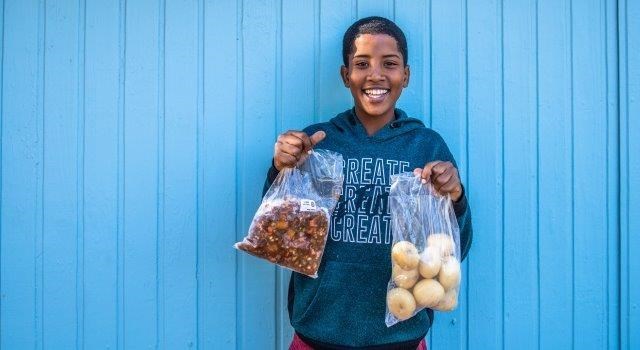What does it take to make 1 million meals? Just over 91 tons of vegetables, many tons of other ingredients and, most importantly, a dedicated, passionate small team that provided relief to thousands of families, and continues to do so.
The organisation quadrupled its daily meal provision since 1 April as unemployment rose and hunger intensified under lockdown, said Dominic Johnson-Allen, Consultant for the Pebbles Kitchen on Klein Joostenberg farm in Stellenbosch.
“Before lockdown, we were already providing 1300 meals daily for disadvantaged children in education centres within agricultural communities of the Western Cape, but the need escalated exponentially due to the lockdown. We are located in the middle of a busy farming area, where many casual workers immediately lost their jobs and their weekly pay,” he said.
“We simply could not ignore the plight of those in desperate need of food and therefore ramped up our scale and distribution points. In addition, we supported NGOs who have been struggling to provide food for the many with absolutely no income and no food, turning our kitchen into a meal provider for thousands.”

The Pebbles Project, established in 2004, provides support and intervention in the areas of education, health, nutrition, community services and social protection to around 1400 children in the areas of Stellenbosch, Somerset West, Wellington, Citrusdal and the Hemel-en-Aarde Valley in Hermanus, and since the agricultural industry was one of the hardest hit as a result of the lockdown, the team intensified their reach and support.
“The lockdown period has been exciting, challenging, fun, heart-warming and tiring! I have loved working with my team and meeting inspiring people, all with a common goal,” says Dominic.
“I have learnt a great deal about how our communities help each other and the generosity of spirit, time, money and food has been incredible. Our next challenge is to find a way to capture this ‘energy’ in creating sustainable feeding solutions for the future.”
With support from a number of volunteers, the small team serviced the areas of Hemel-en-Aarde Valley, Lanquedoc, Kylemore, Klapmuts, Bloekombos, Kraaifontein, Kayamandi, Citrusdal, Wellington, Helderberg, Robertson, Langa, Blue Downs and Stellenbosch.
They also assisted with meals for NGOs such as Lofdal Communities, Kuyasa, the Dwarsrivier Valley Community Office, Bright Smiles, Jesus in Action, Masikhule, Ranyaka, Love2Give, Stellenbosch Unite, ACVV Stellenbosch, GCU, Ons Plek Womens Centre and Somerset West Family Centre.
“We could not have possibly reached this milestone without the generous support of farmers, businesses, individual contributors and our partners. Although we can’t really single out organisations, we have to acknowledge the enormous contributions from Stichting Clouds Foundation, their friends in Holland, the Jannie Mouton Foundation, and the Rhodes Food Group.
All our donors and volunteers have stepped-up and provided us with the necessary resources to ensure that many families have nutritious meals on a daily basis,” says Dominic.
Although the economy has now slowly returned to some form of productivity in Level 1 of lockdown, Dominic says the need is still far greater than anyone really could have anticipated.
“For this very reason, we are continuing to provide meals beyond our Pebbles Project children and families and are looking for new long-term customers, particularly from the education sector, to supply meals to them. With a menu starting at just R5 per meal, we would like to reach as many hungry mouths as possible with healthy, home style, cooked food.”
In addition to the feeding scheme, the Pebbles Project has been a beacon of hope to many during the lockdown period. To reduce the impact of having to close their 39 early childhood development and after-care centres, they provided academic support during lockdown to 1000 children by means of worksheets, WhatsApp academic support groups for high school learners, data and tablets for matric learners, and extra maths support from a group of experienced tutors.
They kept the community clinic in Stellenbosch operational, providing medical support to non-COVID-19 patients, and the social worker teams supported families during this difficult time with counselling and advice.